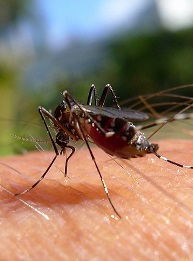Mosquitoes scoring against anti-malarial wall
 There are concerns that thousands of lives may be at risk from the ailing efficacy of a key malaria drug.
There are concerns that thousands of lives may be at risk from the ailing efficacy of a key malaria drug.
The prospect of what might happen if the best methods currently available stop working could be disastrous for millions. To combat the problem, Australian national University Research School of Biology Director,Professor Kiaran Kirk, says new drugs are needed.
The issues will be the topic of Professor Kirk’s discussion at this year’s Last Lecture event at ANU this week.
Despite the urgency of the problem in third-world countries; “there hasn’t been a lot of interest from places like the pharmaceutical industry in developing anti-malarial strategies and drugs,” Professor Kirk says.
“Malaria currently kills something like 650,000 people a year and within the last 12 months it has become clear that in South-East Asia the malaria parasite is beginning to show resistance to the best anti-malarial drug currently available.
“If resistance to this drug reaches Africa it will be a public health disaster, unless we have something to take its place.”
This week’s lecture by Prof Kirk will talk about the historical and economic aspects of malaria research, and showcase some of the University’s recent efforts in the discovery and development of new anti-malarial drugs.
“In particular, I want to highlight to the students in the audience, the sorts of engagement that students here at the ANU can have with research, the sort of impact this can have, and the sort of careers that it can lead to.
“ANU has quite a number of groups working in this area, and students at both the undergraduate and postgraduate level are playing a significant role in the research that these groups carry out.”
More information on this year’s Last Lecture is available online.








 Print
Print